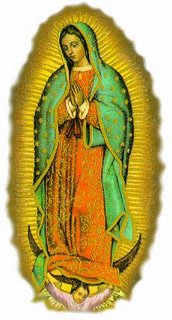There is a custom among us of drawing by lot, on New Year's Day, special Patrons for ourselves for the whole year. In the morning during meditation, there arose within me a secret desire that the Eucharistic Jesus be my special Patron for this year also, as in the past. But, hiding this desire from my Beloved, I spoke to Him about everything else but that. When we came to refectory for breakfast, we blessed ourselves and began drawing our patrons. When I approached the holy cards on which the names of the patrons were written, without hesitation I took one, but I didn't read the name immediately as I wanted to mortify myself for a few minutes. Suddenly, I heard a voice in my soul: "I am your patron. Read." I looked at once at the inscription and read, "Patron for the Year 1935 - the Most Blessed Eucharist." My heart leapt with joy, and I slipped quietly away from the sisters and went for a short visit before the Blessed Sacrament, where I poured out my heart. But Jesus sweetly admonished me that I should be at that moment together with the sisters. I went immediately in obedience to the rule.This was part of an email received by Moneybags at A Catholic Life that spoke of choosing a saint at random to be your patron for the year ... or actually of letting the saint choose you. Moneybags then offered to let others have their patron for the year "chosen" as well.Excerpt from Divine Mercy in My Soul, the Diary of St. Faustina"
I was intrigued by this idea since my experience with any of my favorite saints definitely has been of them making themselves known to me, rather than the other way around.
I looked at this as a way to have God match us up ... to let this saint show me things that I need to learn. So I asked Moneybags to have the emailer pull a saint's name. Then I asked God to send me the saint he wanted me to get to know over the year.
It was definitely with a feeling of amazement that I read that the saint that chose me was Saint Vitus. The patron saint of comedians.
I've said it before, and I'll say it again. God has quite a sense of humor.
Could this matchup be any more perfect?
Well, yes it could.
Saint Vitus is one of the Fourteen Holy Helpers, who, as a group, are especially venerated in France and Germany. The Holy Helpers were believed to possess especially efficacious intercessory power. The relics of Vitus are said to possess many healing properties, especially when epileptics prayed before them.I never heard of the Fourteen Holy Helpers until last year when Yurodivi's wife was diagnosed with cancer and he alerted us to them as intercessors. To see them brought up again like that, so seemingly at random, got my Spidey senses tingling.
I believe Saint Vitus was sent to be my special patron this year.
A year spent with a saint who brings laughter and good will. Sounds good to me.
Read more about Saint Vitus here.Prayer to Saint Vitus
Dear Vitus, the one thing we are certain about is that you died a martyr's death. In early times, churches were dedicated to you in important places. In the Middle Ages, your intercession obtained cures from epilepsy so that this disease came to be called "Saint Vitus' Dance". Inspire comedians to make people dance with laughter and so bear goodwill toward one another. Amen.
Moneybags is happy to pass on the request for your special patron of saint for 2006. All you have to do is hop over there and leave a comment.





